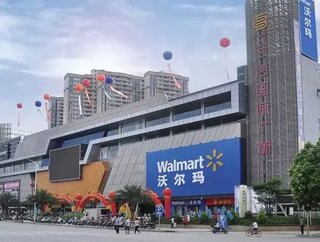Why is Walmart teaming up with IBM?

Food authentication and supply chain tracking are a big deal for companies like Walmart – allowing them to quickly find and address sources of contamination around the world.
As Walmart opened its new Walmart Food Safety Collaboration Center in Beijing, it has announced a project with IBM and Tsinghua University, to improve the way food is tracked, transported and sold to consumers across China.
By harnessing the power of blockchain technology designed to generate transparency and efficiency in supply chain record-keeping, this work aims to help enhance the safety of food on the tables of Chinese consumers.
How can blockchain help supply chain tracking?
Blockchain presents an innovative way to accomplish these goals, by providing a permanent record of transactions which are then are grouped in blocks that cannot be altered. It could serve as an alternative to traditional paper tracking and manual inspection systems, which can leave supply chains vulnerable to inaccuracies.
With blockchain, food products can be digitally tracked from an ecosystem of suppliers to store shelves and ultimately to consumers. When applied to the food supply chain, digital product information such as farm origination details, batch numbers, factory and processing data, expiration dates, storage temperatures and shipping detail are digitally connected to food items and the information is entered into the blockchain along every step of the process.
Each piece of information provides critical data points that could potentially reveal food safety issues with the product. The information captured in each transaction is agreed upon by all members of the business network; once there is a consensus, it becomes a permanent record that can’t be altered. This helps assure that all information about the item is accurate.
The record created by the blockchain can also help retailers better manage the shelf-life of products in individual stores, and further strengthen safeguards related to food authenticity.
Bridget van Kralingen, Senior Vice President, Industry Platforms, IBM, said: “Advanced technology has reached into so many aspects of modern life but it has lagged in food traceability, and in particular in creating more secure food supply chains. Our collaboration with Walmart and Tsinghua University is a step of global significance to change that. Food touches all of us, everywhere, so we are experimenting in China with Walmart and Tsinghua given the size and scale of food consumption in this country.”
Supply Chain Digital's November issue is now live.
Follow @SupplyChainD on Twitter.
Supply Chain Digital is also on Facebook.
- Alberto Medina, Founder of Telescope at P&SC LIVE SingaporeDigital Supply Chain
- Why blockchain is vital to managing risk in the supply chainSupply Chain Risk Management
- How Programmers.io is creating trusted partnershipsDigital Supply Chain
- How Programmers.io is creating trusted partnershipsTechnology






